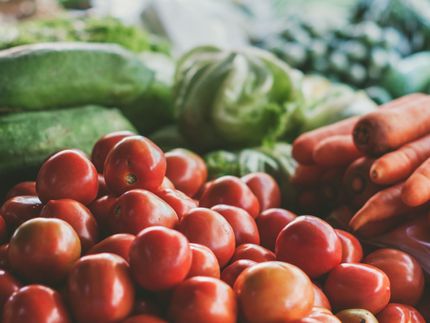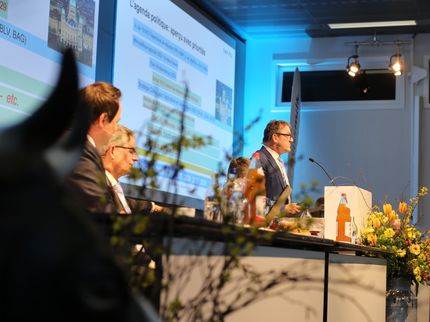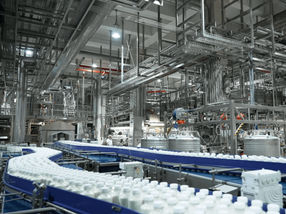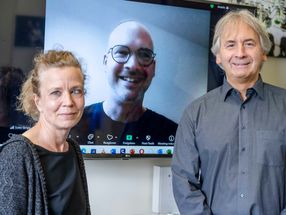Milk will continue to play an important role in our diet in the future
Sabrina Schlegel, Farm Manager and President of Mittelland Milch, is optimistic about the future of the Swiss dairy industry. Despite short- and long-term challenges, she is convinced that milk will continue to play an important role in our diet tomorrow.
Anyone who listens to Sabrina Schlegel immediately realizes that the ETH agronomist and farmer is a woman with clear ideas and a strong commitment to agriculture. She shares her expertise and opinions not only in professional associations and committees, but also on platforms such as LinkedIn, where she comments on current issues in agriculture. There she talks about direct payments, digitalization and the use of technology on farms, wages, workload and resource efficiency.
The farm manager runs a dairy farm in Oschwand BE together with her husband and represents the interests of over 1,700 milk producers as President of Mittelland Milch. She is also a board member of the Swiss Milk Producers (SMP) and a member of the Chamber of Agriculture (LAKA) of the Swiss Farmers' Union (SBV).
Sabrina Schlegel knows what she is talking about when she classifies current challenges, opportunities and developments in the dairy industry: "In agricultural practice, we have the impression that producers are becoming more specialized. They are deciding more consciously on their own production strategy, be it low-cost or high-input, depending on what their own location offers. Cost awareness has also increased."
She adds: "A major trend is sustainability and, in particular, the climate." Projects such as KlimaStaR-Milch show that Switzerland has excellent emission values in an international comparison, which need to be further improved and cleverly marketed.
High workload as a major challenge
Sabrina Schlegel sees one of the biggest challenges in the dairy sector in the high workload with comparatively low hourly wages. She emphasizes that many are no longer willing to compromise on their quality of life: "Our industry is concerned that young farmers are opting less and less for milk production," says Schlegel. "At the SMP, we are committed to making agricultural work more attractive for women and young people and to making a work-life balance possible. The rapidly changing regulations, combined with an enormous bureaucratic burden, are also a deterrent. But this affects the entire agricultural sector."
A trend is also emerging in the optimization of databases. The administrative burden is to be reduced in the coming years. "Today, you have to enter a data record X times. For example, when I inseminate a cow, I have to enter it in the herd management system, in the breeding association and at Agate - when she calves."
Falling foreign purchasing power has an impact
According to Sabrina Schlegel, the expensive Swiss franc, inflation and falling purchasing power abroad are having a negative impact on the milk market. For the first time, more cheese was imported than exported in 2023. Sabrina Schlegel emphasizes: "As a result, less milk reaches the cheese dairies and therefore more restricted milk reaches the large processors such as Emmi. This poses a major challenge, especially in spring, when milk volumes are at their highest. Various processors are also struggling to work economically enough, which in turn has a negative impact on the milk price."
Sabrina Schlegel adds: "The fact that the chocolate industry is once again increasingly relying on processing and foreign milk powder for export chocolate is not easing the situation. In addition, cost awareness has also increased in Switzerland."
Schlegel is optimistic
Despite these challenges, Sabrina Schlegel remains optimistic about the future of the dairy industry. She assumes that over 70% of farms will actively reduce their carbon footprint in the next ten years and that milk production in Switzerland will gain in importance.
This is because the trend towards greater sustainability is continuing, including in milk. "A first step was the introduction of a sustainability standard for milk production by the Milk Sector Organization (BOM). In addition, the BOM Board recently decided to introduce a voluntary climate calculator to collect even more information about our carbon footprint and derive improvement measures from this." The system is voluntary for both sides, which is why it is not yet clear how many producers will ultimately benefit from the contribution of one centime per kg of milk for completing the calculator.
Sabrina Schlegel refers to a recent study by HAFL, which shows that for a sustainable food system, the dairy cow population would have to remain constant plus/minus and the quantities of milk and beef produced would only change slightly. The cow not only provides milk, but also calves and, at the end of the production period, meat itself. "This makes us optimistic and we hope that this insight will also be incorporated into the AP2030+," says Sabrina Schlegel.
Division of labor between mountain and valley
The farmer could very well imagine a division of labor between mountain and valley - but this would have to be supported by direct payments: "One solution would be to wean the calves on the valley farms and fatten them in the mountain area as pasture beef, on farms that no longer milk today."
Sabrina Schlegel is convinced that trends and developments can and should be influenced. For this reason, and precisely because of her interest, it is important to Sabrina Schlegel to play an active role in shaping the future of agriculture and the dairy industry. "Thanks to adjustments in agricultural policy and digitalization, the bureaucratic burden will be reduced and we farmers will be freer to manage our farms with a target-oriented direct payment system." Schlegel says that compensation should be based on target achievement and not, for example, on the time of cutting.
The President of Mittelland Milch is confident that farms will be able to maintain milk production at the current level through their own motivation and with the support of the federal government - so that milk and cheese will be on the Swiss menu at a fair price in 10 years' time.
And Sabrina Schlegel concludes: "The dairy cow is extremely resource-efficient, which is why I am convinced that this cow is the farm animal of the future."
Note: This article has been translated using a computer system without human intervention. LUMITOS offers these automatic translations to present a wider range of current news. Since this article has been translated with automatic translation, it is possible that it contains errors in vocabulary, syntax or grammar. The original article in German can be found here.

































































